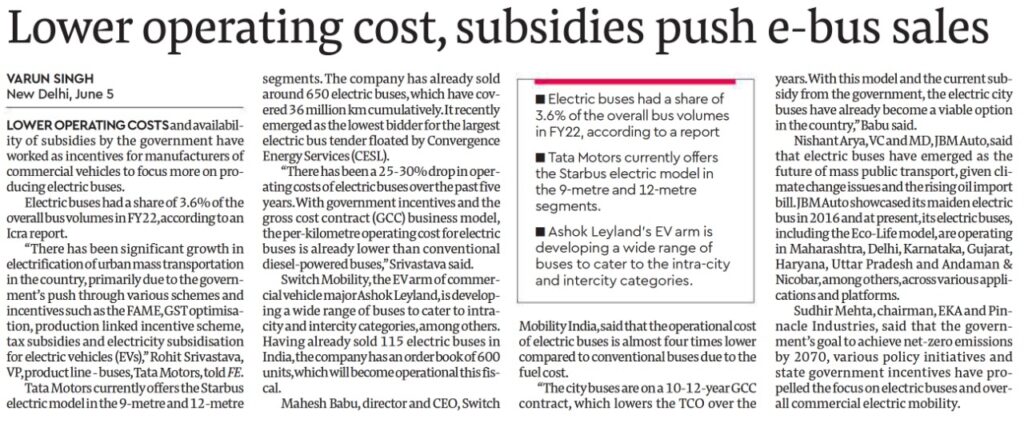Lower operating costs and availability of subsidies by the government have worked as incentives for manufacturers of commercial vehicles to focus more on producing electric buses.
Electric buses had a share of 3.6% of the overall bus volumes in FY22, according to an Icra report.
“There has been significant growth in electrification of urban mass transportation in the country, primarily due to the government’s push through various schemes and incentives such as the FAME, GST optimisation, production linked incentive scheme, tax subsidies and electricity subsidisation for electric vehicles (EVs),” Rohit Srivastava, VP, product line – buses, Tata Motors, told FE
Tata Motors currently offers the Starbus electric model in the 9-metre and 12-metre segments. The company has already sold around 650 electric buses, which have covered 36 million km cumulatively. It recently emerged as the lowest bidder for the largest electric bus tender floated by Convergence Energy Services (CESL).“There has been a 25-30% drop in operating costs of electric buses over the past five years. With government incentives and the gross cost contract (GCC) business model, the per-kilometre operating cost for electric buses is already lower than conventional diesel-powered buses,” Srivastava said.
Switch Mobility, the EV arm of commercial vehicle major Ashok Leyland, is developing a wide range of buses to cater to intra-city and intercity categories, among others. Having already sold 115 electric buses in India, the company has an order book of 600 units, which will become operational this fiscal.
Mahesh Babu, director and CEO, Switch Mobility India, said that the operational cost of electric buses is almost four times lower compared to conventional buses due to the fuel cost.
“The city buses are on a 10-12-year GCC contract, which lowers the TCO over the years. With this model and the current subsidy from the government, the electric city buses have already become a viable option in the country,” Babu said.
Nishant Arya, VC and MD, JBM Auto, said that electric buses have emerged as the future of mass public transport, given climate change issues and the rising oil import bill.
JBM Auto showcased its maiden electric bus in 2016 and at present, its electric buses, including the Eco-Life model, are operating in Maharashtra, Delhi, Karnataka, Gujarat, Haryana, Uttar Pradesh and Andaman & Nicobar, among others, across various applications and platforms. The company is also planning to introduce new variants and platforms of electric buses in different cities of India.
“As a company, we have pledged that our electric buses will clock 1 billion km in the next three-four years,” Arya said.
Sudhir Mehta, chairman, EKA and Pinnacle Industries, said that the government’s goal to achieve net-zero emissions by 2070, various policy initiatives and state government incentives have propelled the focus on electric buses and overall commercial electric mobility.
While EKA recently launched its maiden 9-metre electric city bus, the EKA E9, the company has further plans to introduce a 12-metre electric bus and a hydrogen fuel cell vehicle in the market. “Initially we plan to focus on developing for private sales (staff carriers and school buses), government sales (for both battery electric vehicles and fuel-cell electric vehicles) and intercity coaches,” Mehta said.
Mehta noted that capital expenditure and operating expense cost for both electric and ICE buses, with a daily range of over 250 km, is now almost similar. “It is extremely important for original equipment manufacturers (OEMs) to optimise costs and increase the viability of EVs,” he added.


